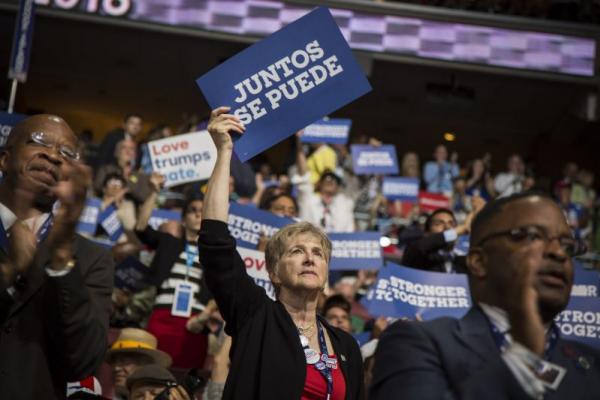“you broke the ocean in
half to be here.
only to meet nothing that wants you.
– immigrant”
― Nayyirah Waheed, salt
My dad was calling me. I didn’t want to answer — he was a registered Republican and somewhat indifferent to the politics of Trump. But he was my Papá, and I wanted to connect with my home and my family that dark night. Florida, my home state, was very close and trending for the Republican nominee for president. There were rumblings that the so-called “Midwest Democratic firewall” was crumbling. That night, as I saw my white friends and fellow Americans vote Donald Trump into the White House, my relationship with America also crumbled.
My family and I were asylum-seekers from Colombia, fleeing the violence and stagnant economy of the early millennium. Growing up, I was intensely aware that my physical home was in Miami, Fla., yet my cultural and familial roots were in a completely different land. In 2010, my parents became United States citizens, granting us the privilege to truly call America home and to engage the political institutions of this country. By that point I was in high school and had taken American history and government. I was amazed at the idea of the United States, and the durability of its political philosophy and foundation. Colombia had completely replaced its constitution in 1991, after many years of corruption and civil war. The stability of America was a welcome balm to my immigrant family.
As Christians, we felt that God had placed a special anointing on this land, and that we were privileged to take part in that. We considered America to be rooted in Judeo-Christian values. This was a country where you could work hard and get ahead; where traditional morality was treasured and not scoffed at. My family found a political home in the Republican party, with its conservative ideologies mirroring those of the Conservative party in Colombia. Eventually I would reject the GOP and my politics would lean more to the left, but my family has remained stalwart conservatives.
This idyllic immigrant story, that has become cliché in conversations of the “good” immigrant, shattered two weeks ago. I woke up to the fact that white America does not care about the well-being of my community. I woke up to the stench of white supremacy, which tells me that I will never be good enough to be fully American. I woke up in tears, because my dear friends who are undocumented immigrants, by no fault of their own, will suffer immensely under a Trump administration. I woke up longing to speak Spanish, to eat a whole Bandeja Paisa, and to feel what home feels like. I finally awoke to the reality that my brown body is a roadblock in white people’s project of making America great again.
Eighty-one percent of my white evangelical friends voted for a man that based his campaign on challenging the “American-ness” of people like me. The same people I studied the Bible with, sang at church with, and whose podcasts I regularly listened to. Four-in-five white evangelicals told me that their whiteness and the power they derive from it is more important than the biblical command of welcoming the stranger. They bowed down to the false god of Supreme Court justices, at the expense of the most marginalized. And as white evangelicals sacrificed brown and black bodies to their political idols, they had the gall to tell me that “God is in control” and “no matter what, we are still brothers and sisters in Christ.”
12 Jesus entered the temple courts and drove out all who were buying and selling there. He overturned the tables of the money changers and the benches of those selling doves. 13 “It is written,” he said to them, “‘My house will be called a house of prayer,’ but you are making it ‘a den of robbers.’” -Matthew 21:12-13 (NIV)
Before Nov. 9, I loved this country. I thought that the United States was a land of immigrants, with some bad and misinformed apples. I understood the existence of systemic injustices based on race, gender, sexual orientation, and class, yet had never fully experienced them. If I am being truly honest, I had slowly begun to forget that I was an immigrant, that I was different, that my slight Spanish accent that came out when I pronounced “almonds” and “salmon” was not the norm. Trump’s election called me back to my immigrant roots.
I no longer feel comfortable in white spaces and overwhelmingly white institutions, no matter how “progressive” they claim to be. My urges now include to see, interact, and work with people who look, talk, and experience America like me.
Friday after the election, I was walking home from happy hour with my roommates. We were walking past a local Hispanic supermarket in our neighborhood when I felt an urge to go inside. I did, and it was exactly what I needed — I marveled at the labels, all in Spanish, and lusted after the Mexican tortas y conchas that were baked daily here. I admired the Salvadorian laborer who was buying groceries after a long day of physical toil. I longed for my family as I saw the Dominican mother chastising her young son for his misbehavior, a tired but loving expression painted on her face. And then I remembered what President-elect Donald Trump had said about these beautiful lives. Trump lied. He declared that criminality, and not love, was the main motivation for immigrants. He looked at assimilated immigrants like myself, and Judge Curiel, and said that our ethnicity forbids us from ever being truly American. He profaned our culture with his cheap appeals to our community, using fear, division, and a bad pronunciation of “bad hombres” to scare us.
I wept in that supermarket that night. I wept walking back home. I wept to my roommates, stricken with grief for our neighbors who had so much to lose in a Trump presidency. I thought of my own parents, and how much they sacrificed for me to have the advantages I have today. I thought of the psychological toll of leaving your country, your family, your language for a strange land, filled with people who are deeply skeptical of your presence. Their fear of xenophobia and racism was validated on Nov. 9. And it is for my immigrant parents that I have chosen to heal and to resist.
Today, I reject the idea that America was founded on Judeo-Christian values. It was founded on white supremacy, and that legacy still haunts us today.
Got something to say about what you're reading? We value your feedback!

